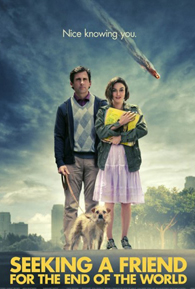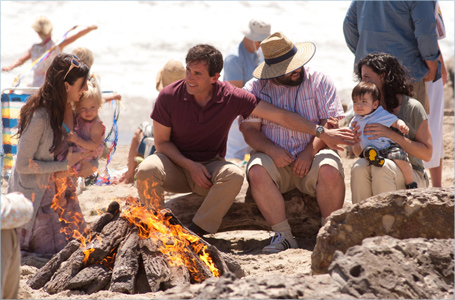
In The Dark Knight Returns, the villain Bane beats Batman, takes over Gotham and tells its inhabitants that the city will be destroyed in a fiery nuclear Armageddon. And no, he won't allow anyone to leave — himself included. The upside? He's letting them run the city from now on. And despite his contempt for the unwashed masses, Gotham doesn't quite implode in an orgy of self destruction.
Lorene Scafaria's Seeking a Friend for the End of the World has a view of human nature. The writer-director suggests that faced with the imminent destruction of life on Earth from a full-on meteorite collision, most humans will go slightly unhinged and antsy, end up doing highly illegal or very illogical things. But no, there will be no major riots of any sort. The world will end not in a bang but with a whimper because at the end of the day, within the deep recesses of our collective humanity, it is still Apollo who triumphs over Dionysus.
Of course when you settle on a premise like that, the mode of storytelling is tragicomedy. That's easy. But what kind of story can you tell from this? I suspect Lorene Scafaria might have been influenced by American graphic novelist Chris Ware's Jimmy Corrigan: Smartest Kid in the World, a depressingly funny tale of suburban middle class angst full of just-so ironic vignettes that crush your spirit as much as they put a wry smile on your face.
Scafaria's film does pretty much the same thing. On a long road trip across the east coast, Dodge (trying to get in touch with a high school sweetheart who writes two weeks before the end of the world) and Penelope (trying to hitch a flight back home to England) encounter a dazzling array of people living their last days. They meet with yuppies throwing bacchanal parties, eat in a diner whose crew are way too eager to ensure their customers have a good time, visit a bunch of survivalists who believe their steel-reinforced bunker will allow some protection from the impending meteorite event. At his job, Dodge deals with customers who still call to enquire if their insurance policies cover Armageddon while at home, he despairs at the impossibility of firing his Hispanic maid, who either doesn't know the world is ending or decides to ignore that fact and insists on coming in at the usual time "next week", even if there's no next week.
Yes, there's some attempt at a romcom ending but what hits you more are the almost episodic vignettes that make this film — and how they distill via repetition and variation the essence of the idea that some things can be funny and sad at the same time. Perhaps this would be far better as a graphic novel instead of a feature film but in those 90 minutes, we are treated to darkly funny but humane vision of the world — far darker and less comical than what Hollywood dares to produce but perhaps with more qualified optimism than outright misanthropy that graphic novelists tend towards.












 Printable Version
Printable Version


















Reader's Comments
Be the first to leave a comment on this page!
Please log in to use this feature.